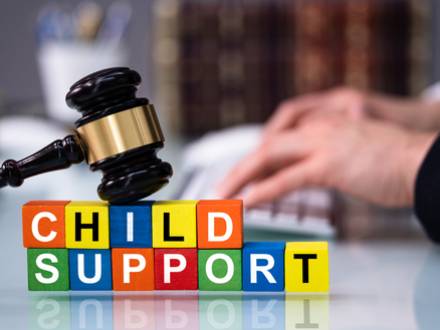Free Initial Consultations
 630-580-6373
630-580-6373With offices in Naperville, Joliet, Wheaton, Plainfield & Chicago
 Issues of child support are often about more than money and can be very emotional for everyone involved. Mistakes may be made by both the party paying child support and the party receiving child support. Still, many of these common mistakes can be avoided with the assistance of a knowledgeable Wheaton, IL child support attorney who is able to provide realistic legal guidance.
Issues of child support are often about more than money and can be very emotional for everyone involved. Mistakes may be made by both the party paying child support and the party receiving child support. Still, many of these common mistakes can be avoided with the assistance of a knowledgeable Wheaton, IL child support attorney who is able to provide realistic legal guidance.
In high-stakes child support cases, you need a dedicated advocate at your side. At Davi Law Group, we have received numerous honors for our hard work in family law cases, including recognition as a Leading Lawyer. Whether you are the custodial parent or not, we can stand up for your rights in disputes about support.
 For a divorcing parent, the pressures you face are amplified, as your responsibilities are nearly doubled due to the transitional needs of the entire family. Not only do you need to make living and financial arrangements for yourself while also looking after your physical and emotional health, but you must also make arrangements for any children you share with your spouse.
For a divorcing parent, the pressures you face are amplified, as your responsibilities are nearly doubled due to the transitional needs of the entire family. Not only do you need to make living and financial arrangements for yourself while also looking after your physical and emotional health, but you must also make arrangements for any children you share with your spouse.
A solid parenting agreement is essential when entering post-divorce life, as it will provide the legal blueprint for how you will continue to raise your child once you are separated. At Davi Law Group, our Wheaton, IL child custody lawyer can help protect your parental rights with a solid parenting plan. We have over 20 years of legal experience, so you can rely on us to guide you through your case.
 Children typically benefit from having both parents involved in their lives. However, this is probably not the case if one parent isn’t fit to handle the responsibilities of child custody. If you believe that terminating your ex’s parental rights is in your child’s best interest, reach out to a Wheaton, IL family law attorney today.
Children typically benefit from having both parents involved in their lives. However, this is probably not the case if one parent isn’t fit to handle the responsibilities of child custody. If you believe that terminating your ex’s parental rights is in your child’s best interest, reach out to a Wheaton, IL family law attorney today.
At Davi Law Group, we take your child’s best interests seriously. Attorney Dion U. Davi has years of legal experience, and he has had speaking engagements at the DuPage County Bar Association about complex child custody issues. You can rely on our firm to provide you with qualified legal advice as we take steps to protect your child in the long term.
In Illinois, a court can end a parent’s legal rights without their consent. This is called involuntary termination. It is a serious step designed to protect children from harm. Common reasons include abuse, neglect, abandonment, or failure to support the child.
 Illinois has one of the lowest divorce rates in the country, as reported by The Daily Northwestern. Whether due to social pressure or other reasons, you might feel anxious about serving your spouse with divorce papers. However, in Illinois, you cannot legally divorce someone without first providing proper notice. There are a few exceptions to this rule, but they are very limited.
Illinois has one of the lowest divorce rates in the country, as reported by The Daily Northwestern. Whether due to social pressure or other reasons, you might feel anxious about serving your spouse with divorce papers. However, in Illinois, you cannot legally divorce someone without first providing proper notice. There are a few exceptions to this rule, but they are very limited.
Considering a divorce but not sure how to go about filing? Speak with a Wheaton, IL family law attorney to discuss your options as soon as possible. Attorney Dion U. Davi of Davi Law Group has years of experience as a former Assistant State’s Attorney, allowing him to guide clients through court proceedings with confidence.
 Getting a divorce is a life-altering decision. If you find yourself questioning whether it’s the right move, you’re not alone. Emotions can shift once paperwork is filed and reality sets in. If you are feeling unsure, overwhelmed, or hopeful about reconciliation, you have options. First, speak with a Wheaton, IL divorce lawyer to understand what you can do to stop the case from moving further.
Getting a divorce is a life-altering decision. If you find yourself questioning whether it’s the right move, you’re not alone. Emotions can shift once paperwork is filed and reality sets in. If you are feeling unsure, overwhelmed, or hopeful about reconciliation, you have options. First, speak with a Wheaton, IL divorce lawyer to understand what you can do to stop the case from moving further.
Regret is very common after filing for divorce, especially early in the process. Divorce filings often happen during periods of stress, conflict, or emotional exhaustion. Once the initial crisis passes, doubts may surface.
That does not always mean divorce was a mistake. It can stem from fear of change, financial uncertainty, concern about children, or pressure from others. In some cases, it reflects a genuine desire to reconcile. Illinois law allows room to reassess, depending on where the case stands.
 Infidelity can devastate a marriage, and unfortunately, it is a common reason for divorce. The emotional impact alone of discovering an affair can be life-changing. However, it can also raise difficult legal questions.
Infidelity can devastate a marriage, and unfortunately, it is a common reason for divorce. The emotional impact alone of discovering an affair can be life-changing. However, it can also raise difficult legal questions.
Can you hold your spouse’s affair partner accountable? Do affairs come up in divorce proceedings? What do you do if your spouse spent shared money on that affair? Illinois law draws a clear line between moral wrongdoing and financial misconduct. Understanding that distinction can help you protect yourself during a divorce, and our DuPage County, IL divorce lawyer can help.
After discovering infidelity, wanting to hold the people who wronged you accountable is understandable. In some states, this is possible. Laws known as "alienation of affection" or "criminal conversation" once allowed a betrayed spouse to sue the third party for breaking up a marriage.
 Concerns about how child support money is used can create serious tension between co-parents. You want to know that your payments are truly helping your child, not being wasted or mismanaged. Illinois courts recognize this concern, but they also protect a parent’s discretion to manage their household. If you have concerns about how support is being used or enforced, our Wheaton, IL child support lawyer can explain how the law applies to your situation.
Concerns about how child support money is used can create serious tension between co-parents. You want to know that your payments are truly helping your child, not being wasted or mismanaged. Illinois courts recognize this concern, but they also protect a parent’s discretion to manage their household. If you have concerns about how support is being used or enforced, our Wheaton, IL child support lawyer can explain how the law applies to your situation.
Under 750 ILCS 5/505, child support in Illinois is meant to cover all the reasonable and necessary costs of raising a child. This includes essential needs such as:
Housing and utilities
 Learning that a guardian ad litem (GAL) has been appointed in your case can feel overwhelming. It is common for parents to worry that a court bringing in the help of a GAL means they are doing something wrong. It is natural to feel nervous when it seems like every decision is under scrutiny. However, a GAL is not there to criticize your parenting or to take your kids away from you. Their role is to look closely at your children’s lives and make recommendations to a judge about what is in each child’s best interest in a child custody or divorce case.
Learning that a guardian ad litem (GAL) has been appointed in your case can feel overwhelming. It is common for parents to worry that a court bringing in the help of a GAL means they are doing something wrong. It is natural to feel nervous when it seems like every decision is under scrutiny. However, a GAL is not there to criticize your parenting or to take your kids away from you. Their role is to look closely at your children’s lives and make recommendations to a judge about what is in each child’s best interest in a child custody or divorce case.
You will have questions throughout the process. For answers, work with an experienced DuPage County, IL family law attorney who understands GAL investigations and can guide you through every stage of the process.
Under 750 ILCS 5/506, a court may appoint a GAL to interview, investigate, and make recommendations to the judge. The GAL represents the child’s interests, not either parent’s. Ultimately, Illinois courts must base custody decisions on what serves the child’s best interests, and a GAL is there to support that standard. They assess and discuss the child’s safety, emotional needs, and the ability of each parent to provide a stable home.
 Divorcing spouses must resolve several crucial issues before ending their marriage. Marital property and joint debt need to be divided between the spouses. If the couple had children, they would need to develop a parenting plan and decide how they will divide parenting time and parental responsibilities. If there is a large financial discrepancy between the spouses, they may need to address spousal maintenance.
Divorcing spouses must resolve several crucial issues before ending their marriage. Marital property and joint debt need to be divided between the spouses. If the couple had children, they would need to develop a parenting plan and decide how they will divide parenting time and parental responsibilities. If there is a large financial discrepancy between the spouses, they may need to address spousal maintenance.
Some couples are able to negotiate an agreement about these issues without the court's involvement. However, litigation is often necessary in complex and contentious divorce cases. A Wheaton, IL divorce lawyer at Davi Law Group can guide you through the process while making sure that your rights are protected.
A deposition is a legal interview that happens before trial. It allows lawyers to ask a witness or spouse questions under oath. Everything said is recorded by a court reporter and later typed into a written transcript.
 An uncontested divorce is generally a smoother and more cooperative way to end a marriage. It is arguably simpler, but there are still important legal steps to follow. Small mistakes can delay the process or cause problems in the future. Working with a DuPage County, IL divorce lawyer can help you avoid errors, ensure your paperwork is correct, and protect your rights during and after the divorce.
An uncontested divorce is generally a smoother and more cooperative way to end a marriage. It is arguably simpler, but there are still important legal steps to follow. Small mistakes can delay the process or cause problems in the future. Working with a DuPage County, IL divorce lawyer can help you avoid errors, ensure your paperwork is correct, and protect your rights during and after the divorce.
An uncontested divorce happens when both spouses agree on every major issue. These include property division, spousal maintenance, child custody, parenting time, and child support. Since there are no disputes, uncontested divorces are usually faster and less expensive.
A contested divorce occurs when the spouses cannot agree on one or more important issues. Even a single disagreement can make a case contested. For example, if you cannot decide who should keep the home or how to split your debt, your divorce becomes contested. The process often involves multiple hearings, mediation, and sometimes even a trial before a judge. As a result, they can take longer and cost more. Overall, a contested divorce is more stressful.
